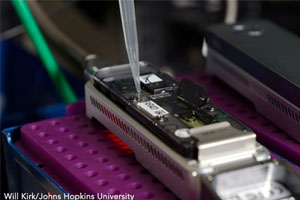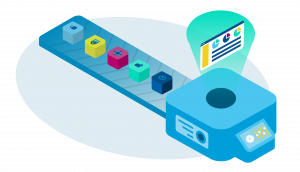Receive the latest news, event invites, funding opportunities and more from the Ontario Institute for Cancer Research.
Cancer projects today are large in scale and create large amounts of data. These big data projects take a lot of work to run and to track all the data they produce. The Genome Informatics (GI) Program builds websites and software tools that allow researchers and the public to access, manage and study large amounts of cancer data.
Almost all human diseases, like cancer, have some basis in our genes. With advances in research tools, researchers can find changes in our genes to learn what causes cancer and how to treat it more effectively. Around the world, cancer researchers collect large amounts of data about our genes. This data can be used to answer problems in cancer research. But these researchers need help to manage, sort and access this data. So they need websites and software tools for sharing data across the cancer research community safely and securely, and always with patient consent. Researchers can then use this data to make new discoveries faster and treat cancer better, leading to improved patient outcomes.
GI is made up of two teams. The Software Engineering team builds websites and software tools for big data projects around the world. These projects include the International Cancer Genome Consortium (ICGC) and the Cancer Genome Collaboratory. The Research IT team provides safe and secure big data storage and advanced computing power. These resources allow cancer researchers to work with and share data from their work. The GI teams also help the Adaptive Oncology (AO) Program and OICR achieve their cancer research goals.
Our program’s resources and skills are shared with Ontario and the global research community. We also connect people to the data to advance research about cancer and other diseases.

Program Manager
Dr. Robin Haw
robin.haw@oicr.on.ca
Telephone: 647-260-7985
The Genome Informatics Program develops new software, databases and other necessary components to store, organize and compute over the large and complex datasets being generated by OICR’s cancer research programs. Our resources and expertise are shared with the Ontario cancer research community, with the goal of accelerating cancer research and bringing treatments to the clinic faster.
Our mission is to advance the knowledge and treatment of cancer by facilitating computation on big cancer datasets.
Our research objectives are to:
The Genome Informatics Program is open to and encourages research collaborations. Please contact any of the Principal Investigators or review our Collaborative Research Resources Brochure for more information.
Further opportunities to collaborate
OICR is committed to strengthening cancer research in Ontario through collaboration and broadening access to our technology infrastructure, expertise and resources. Please visit OICR’s Collaborative Research Resources directory for more opportunities to collaborate.
Principal investigators and directors in the Genome Informatics Program have a broad set of interests and expertise, ranging from high-performance computing and data portals, to software development for big data. While our computational activities and expertise focus on cancer, they also have broader application in genomic research. For example, Genome Informatics oversees the development of multiple websites for various Canadian and International research projects, such as the Ontario Health Study and the NCI Genomic Data Commons.
The Genome Informatics Program is involved in a wide variety of informatics projects. We play both leadership and collaborative, scientific roles in many large-scale computational initiatives, with a strong mandate to output to the scientific community open-source, open-access data, tools and resources.
Projects under the Genome Informatics Program include:
In an international consortium that is generating novel human tumor-derived culture models, which are annotated with genomic and clinical data.






